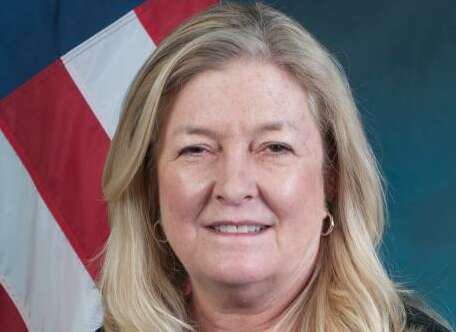
Biden administration looking to axe another policy from the Trump era
In today's Federal Newscast, the Labor Department's Office of Federal Contract Compliance Programs has proposed rescinding a Trump era rule.
To listen to the Federal Newscast on your phone or mobile device, subscribe in PodcastOne or Apple Podcasts. The best listening experience on desktop can be found using Chrome, Firefox or Safari.
- The Biden Administration is moving to axe another policy measure from the previous administration. The Labor Department’s Office of Federal Contract Compliance Programs (OFCCP) has proposed rescinding a Trump era rule giving faith-based contractors more flexibility when it came to anti-discrimination laws. The original rule went into effect in January. OFCCP says it wants to scrap it because of its lack of clarity, and also were unable to identify a need for the rule.
- Collaboration among agencies is about to get a lot easier. Imagine not having to send an email to ask if a colleague at another agency is free for a meeting. Imagine sending an instant message to ask a quick question to that same person without using email. These capabilities are what the CIO Council will soon deliver at scale. Maria Roat, the federal deputy CIO, says the pilot with NASA, the Small Business Administration, National Science Foundation and Department of Education worked so well that the council is expanding the shared calendars and chat capabilities to all agencies in early 2022. Roat says the pilot helped solve the records management and cybersecurity concerns that stopped these capabilities from being available previously. (Federal News Network)
- Most agencies are meeting requirements under the 2014 DATA Act to submit spending data to USASpending.gov. The Government Accountability Office finds more than 80 agencies out of 100 submitted their latest spending data to the Treasury Department on time. The watchdog also found the data agencies submitted largely matched the data available on their agency websites. GAO recommends Treasury and OMB follow up with agencies periodically to resolve data quality issues.
- The Census Bureau is looking to expand a survey it launched in response to the COVID-19 pandemic. The bureau is asking the Office of Management and Budget for approval to conduct bi-weekly Business Pulse Surveys for the next three years. The bureau will use this data to track the health of the economy as it recovers from the pandemic. The bureau launched its first pulse surveys in April 2020 to understand the pandemic’s toll on households and small businesses. The bureau through its first-round of pulse surveys could only reach out to small businesses with fewer than 500 employees, but will broaden its outreach in future iterations. (Federal News Network)
- The Department of Veterans Affairs is looking for feedback on its community care access standards. Members of the public have an opportunity to comment on current criteria for veterans to access community care and its quality standards. VA Secretary Denis McDonough says the solicitations are part of the department’s efforts to fully implement the 2018 MISSION Act. VA will launch a broader review of its healthcare standards later this year to ensure they level up to other metrics in the health care industry.
- Members of Congress want to level the playing field for federal retirees and their Social Security benefits. The top Republican on the House Ways and Means Committee is pushing for reforms to the Windfall Elimination Provision. The WEP reduces Social Security benefits for some retirees who worked in both the public and private sectors. The Equal Treatment of Public Servants Act would replace the old formula for calculating Social Security benefits. Some retirees would get a rebate to offset the impacts of the WEP.
- The new GSA administrator is promising a focus on the basics. Robin Carnahan, now four months into the job, told attendees of the ACT-IAC ELC 21 conference she wants GSA to become easier for federal contractors to deal with. One way will be with continued development of the basic online environment it operates, SAM.gov. She said the government also needs to become a better buyer with clearer, more concise requirements. Carnahan, who earlier led part of GSA’s 18F digital development team, said the fundamental requirement for 18F remains delivering software that works.
- The IRS is about a month away from results of a round of contracts for special projects. That’s according to Harrison Smith, director of the IRS enterprise digitization and case management office. IRS has contracts with 14 vendors to develop prototypes for three projects. Extracting machine-readable data from low resolution images of paper forms, scanning documents as a service and augmented reality to aid taxpayers in getting answers to questions. Harrison said that because IRS lacks other transaction authority for prototypes, it used the standard procurement procedures. But each award was made within a month of receipt of bids. Harrison spoke at the ACT-IAC conference in Hershey, Pennsylvania.
- The Department of Homeland Security’s mega IT hardware and services contract is facing another delay, but it’s because of protests this time. DHS received more than 600 bids from more than 300 offerors for the contract, and reviewing those proposals is pushing back the timeline for the first downselect. In a notice on the SAM.gov platform, DHS revised its schedule. The first downselect now is scheduled for December instead of November, and awards are expected in August. FirstSource 3 is a small business vehicle and has a $10 billion ceiling.
- An influx of funding is on the way for a new White House cyber office. The infrastructure bill passed by Congress last week includes $21 million for the Office of the National Cyber Director. The funds are expected to go toward hiring personnel for the new office. Chris Inglis was confirmed by the Senate as the first national cyber director over the summer. He told a House committee last week that his office has been constrained by the lack of a budget. With funding available, he said he’d hire 25 people by December, with an eventual goal to reach a total of 75 staff next year.
- The Defense Department’s commercial technology incubator is planting its flag in Illinois. The Defense Innovation Unit will open an office in Chicago next year as part of an effort to work with more companies in the midwest. DIU is employing a new regional outreach strategy to connect DoD to more companies, labs, academic partners and investors across the country. The Chicago location will be the fifth office DIU has opened since it was established in Silicon Valley in 2015.
Copyright © 2024 Federal News Network. All rights reserved. This website is not intended for users located within the European Economic Area.
Eric White
Eric White is news anchor and Federal Drive producer at Federal News Network.
Follow @FEDERALNEWSCAST




